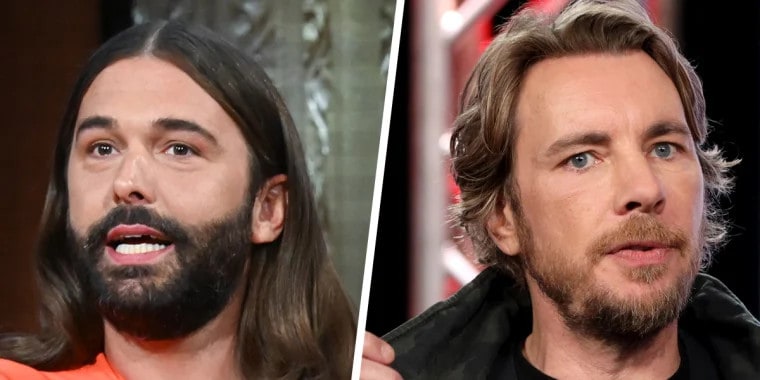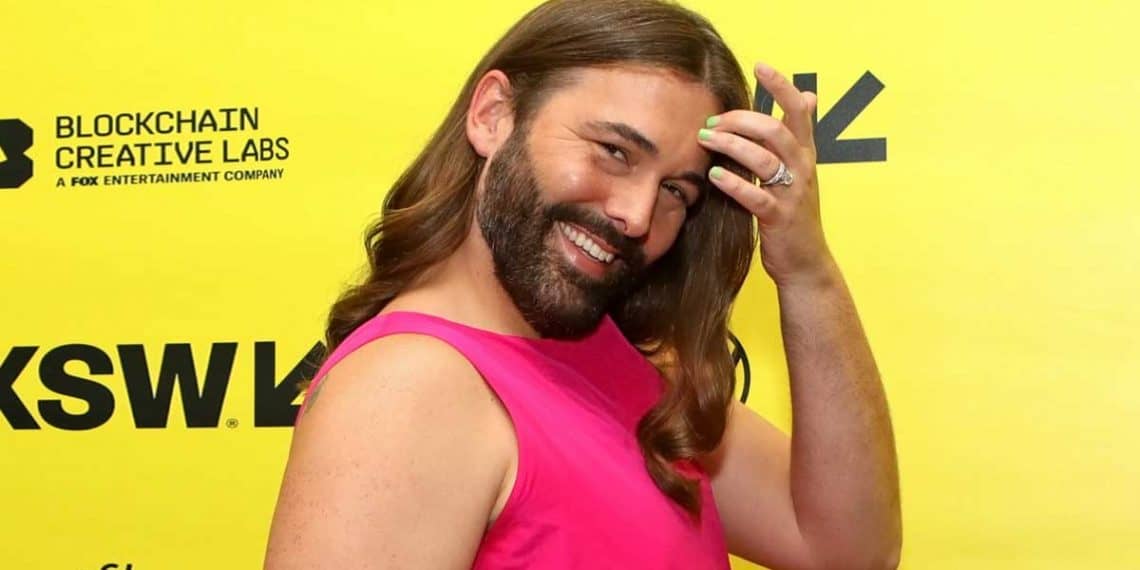Jonathan Van Ness suggested that he has more to share following a heated discussion with Dax Shepherd regarding transgender rights. Via his Instagram Story on September 27, the 36-year-old Van Ness expressed his difficulty finding the right words but indicated he would eventually speak further. He included a screenshot of his appearance on Dax Shepherd’s “Armchair Expert” podcast, which occurred on September 25.
Jonathan Van Ness, who identifies as nonbinary and uses all pronouns, also shared a video from activist Alicia Roth Weigel, whose work was mentioned during the interview. In the video, Weigel commended Jonathan Van Ness for advocating for intersex people and acknowledging the burden placed on them to be an expert on all marginalized communities to combat misinformation.
Despite some factual inaccuracies in Van Ness’s account of Weigel’s experiences, the two had a conversation in which Van Ness apologized and explained, feeling pressured to provide as much information as possible during the discussion with Shepherd.
Wiegel emphasized the unfair expectation for Van Ness to be a spokesperson for all marginalized groups and urged against constantly subjecting individuals to such scrutiny.
Van Ness passionately defended the rights of transgender.
The conversation on “Armchair Expert” originally focused on Van Ness’s podcast, “Getting Curious,” but it shifted when Dax Shepherd began questioning gender-affirming care for transgender youth.
Van Ness passionately defended the rights of transgender individuals, expressing disappointment that some, including Dax Shepherd, exclude trans kids from sports in the advocacy for women’s rights.
Jonathan Van Ness clarified that not all who hold such beliefs are necessarily transphobic but may unknowingly support transphobic ideologies. The discussion was emotionally charged, with Van Ness breaking down in tears, expressing exhaustion from advocating for inclusion and acceptance of young transgender individuals.
Dax Shepherd did not respond to the controversy surrounding the episode and instead shared unrelated photos from the podcast recording on Instagram.
In essence, Jonathan Van Ness hinted at his intention to further address the topic after a contentious conversation with Dax Shephard about transgender rights, emphasizing the challenges he faces in being a spokesperson for various marginalized communities and the importance of understanding the complexities of these issues.

Jonathan van Ness, known for their role in the hit Netflix show Queer Eye and their roles as a beauty influencer and entrepreneur, used Instagram on Wednesday to react to comments made by Megyn Kelly, which ridiculed their support for including transgender individuals in sports.
In a passionate video, Jonathan Van Ness refuted Kelly’s claim that trans-inclusion posed a threat to women’s sports and delved into the larger matters of gender equality and equity in the world of athletics.
Van Ness Already Had to Defend Trans Rights This Week
This incident occurred shortly after Jonatha Van Ness appeared on Dax Shepard’s podcast, “Armchair Expert.” During the interview, the two engaged in a heated debate on whether The New York Times leans towards progressive viewpoints and later discussed the contentious issue of transgender inclusion in sports.
Despite Shepard’s self-identification as a Democrat supporting liberal causes, he presented opposing arguments on transgender rights, which surprised Van Ness, a prominent figure from “Queer Eye.”
The conversation was charged with tension as Shepard and Jonathan Van Ness navigated a discussion entrenched in current political debates, including the legislative actions regarding transgender participation in sports in different U.S. states. Van Ness identifies as nonbinary bullying under the pretext of “protecting girls in sports.”
Van Ness argued that when an exceptionally strong reaction occurs, it often indicates exposure to misinformation and disinformation. They highlighted the prevalence of misleading information in the discourse against trans inclusion.
Van Ness clarifies that they weren’t labeling Shephard a transphobic but emphasized that someone could hold biases that inadvertently perpetuate trans misogyny or transphobic ideas, similarly to how they had to challenge their own biases regarding white privilege and refrain from speaking over individuals of color when discussing racism or police brutality.
At certain points, the conversation moved Van Ness to tears. They expressed exhaustion from constantly advocating for the inclusion and well-being of young transgender individuals. They wished that people would show the same passion for ensuring the inclusion and growth of these children as they did for concerns about fairness in women’s sports, which Van Ness referred to as “fictitious” in some contexts.




